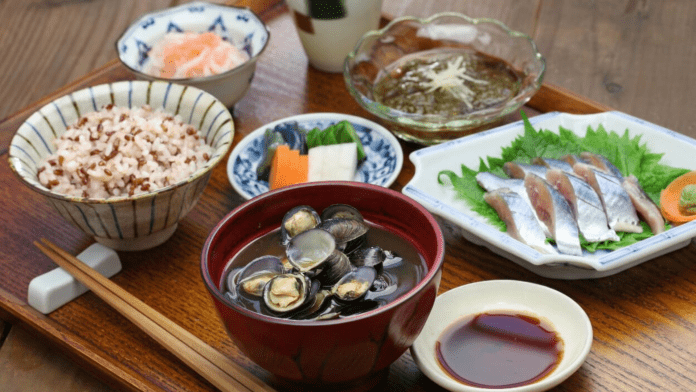In the hustle and bustle of modern life, finding balance and purpose can seem like an elusive quest. We yearn for a sense of fulfillment, longevity, and overall well-being. Fortunately, the ancient wisdom of Japanese culture offers us valuable insights through the concept of Ikigai. Derived from the words “iki” meaning life and “gai” meaning worth or value, Ikigai represents the convergence of passion, mission, vocation, and profession—the sweet spot where joy, purpose, and fulfillment intersect.
While Ikigai is often associated with finding purpose in one’s life, it also encompasses a holistic approach to well-being, including a unique diet that has been linked to longevity and vitality. This diet, known as the Ikigai Diet, is not just about what we eat but also how we eat, combining nourishment for the body, mind, and soul. So, let’s embark on a journey to uncover the secrets of the Ikigai Diet and learn how it can unlock longevity and total well-being.
The Origins of Ikigai: More than Just a Diet
Before we dive into the specifics of the Ikigai Diet, let’s explore the origins and philosophy behind this concept. Ikigai finds its roots in the Okinawan culture, which boasts one of the highest concentrations of centenarians in the world. The Okinawan people have long been admired for their longevity and vibrant health, with many individuals living well into their 100s while maintaining a high quality of life.
Okinawans attribute their longevity to a combination of factors, including their strong sense of community, active lifestyle, and deep connection with nature. However, their diet plays a significant role in this equation. The traditional Okinawan diet forms the foundation of the Ikigai Diet, providing a blueprint for healthy eating habits and overall well-being.
Unveiling the Ikigai Diet: A Balanced and Wholesome Approach
The Ikigai Diet encourages a balanced and wholesome approach to eating, focusing on natural, nutrient-dense foods that nourish the body and promote vitality. Here are the key principles that guide the Ikigai Diet:
- Plant-Based Emphasis: The Ikigai Diet places a strong emphasis on plant-based foods, particularly vegetables, fruits, legumes, and whole grains. These foods provide essential vitamins, minerals, fiber, and antioxidants that support overall health and longevity.
- Mindful Eating: In the fast-paced world we live in, it’s easy to fall into the habit of mindless eating. The Ikigai Diet emphasizes the importance of mindful eating, savoring each bite, and paying attention to hunger and fullness cues. By cultivating a mindful eating practice, we can develop a healthier relationship with food and derive more satisfaction from our meals.
- Moderation and Balance: While the Ikigai Diet primarily focuses on plant-based foods, it also includes moderate amounts of lean proteins such as fish, tofu, and tempeh. These protein sources provide essential amino acids and omega-3 fatty acids, which contribute to overall well-being. Additionally, the diet promotes consuming healthy fats in moderation, such as those found in avocados, nuts, and seeds.
- Local and Seasonal Foods: In line with the principles of sustainability and environmental stewardship, the Ikigai Diet encourages the consumption of local and seasonal foods. By choosing fresh, locally sourced ingredients, we not only support local farmers but also enjoy the optimal nutritional value and flavor of the produce.
- Hydration and Herbal Teas: Staying hydrated is crucial for maintaining overall health, and the Ikigai Diet recognizes the importance of proper hydration. Water is the primary beverage of choice, but herbal teas, such as green tea and hibiscus tea, are also highly regarded for their health-promoting properties.
The Health Benefits of the Ikigai Diet
The Ikigai Diet offers a myriad of health benefits that contribute to longevity and total well-being. Let’s explore some of the key advantages associated with this dietary approach:
- Longevity and Healthy Aging: The plant-based nature of the Ikigai Diet, coupled with the inclusion of nutrient-dense foods, provides ample antioxidants, vitamins, and minerals that support cellular health and combat oxidative stress. These factors are believed to contribute to healthy aging and longevity.
- Reduced Risk of Chronic Diseases: By focusing on whole, unprocessed foods and minimizing the consumption of processed and refined products, the Ikigai Diet helps reduce the risk of chronic diseases such as heart disease, type 2 diabetes, and certain types of cancer. The diet’s emphasis on plant-based foods also promotes a healthy weight and optimal blood sugar control.
- Improved Gut Health: The Ikigai Diet’s high fiber content, derived from fruits, vegetables, and whole grains, promotes a healthy gut microbiome. A diverse and balanced gut microbiota is associated with improved digestion, enhanced immune function, and a reduced risk of gastrointestinal disorders.
- Mental Well-Being: The Ikigai Diet recognizes the connection between diet and mental health. By prioritizing nutrient-dense foods and incorporating omega-3 fatty acids from sources like fish and plant-based alternatives, the diet supports brain health, cognitive function, and emotional well-being.
- Increased Energy and Vitality: The Ikigai Diet’s focus on whole, unprocessed foods provides sustained energy throughout the day. By avoiding excessive consumption of refined sugars and processed snacks, individuals following the Ikigai Diet may experience improved energy levels and increased vitality.
Final Thoughts:
The Ikigai Diet offers more than just a way of eating—it presents a holistic approach to well-being and longevity rooted in the wisdom of the Okinawan culture. By adopting the principles of the Ikigai Diet, including an emphasis on plant-based foods, mindful eating, moderation, and balance, individuals can unlock the potential for a healthier, more fulfilling life.
So, why not start your Ikigai journey today and discover the transformative power of this ancient wisdom?



